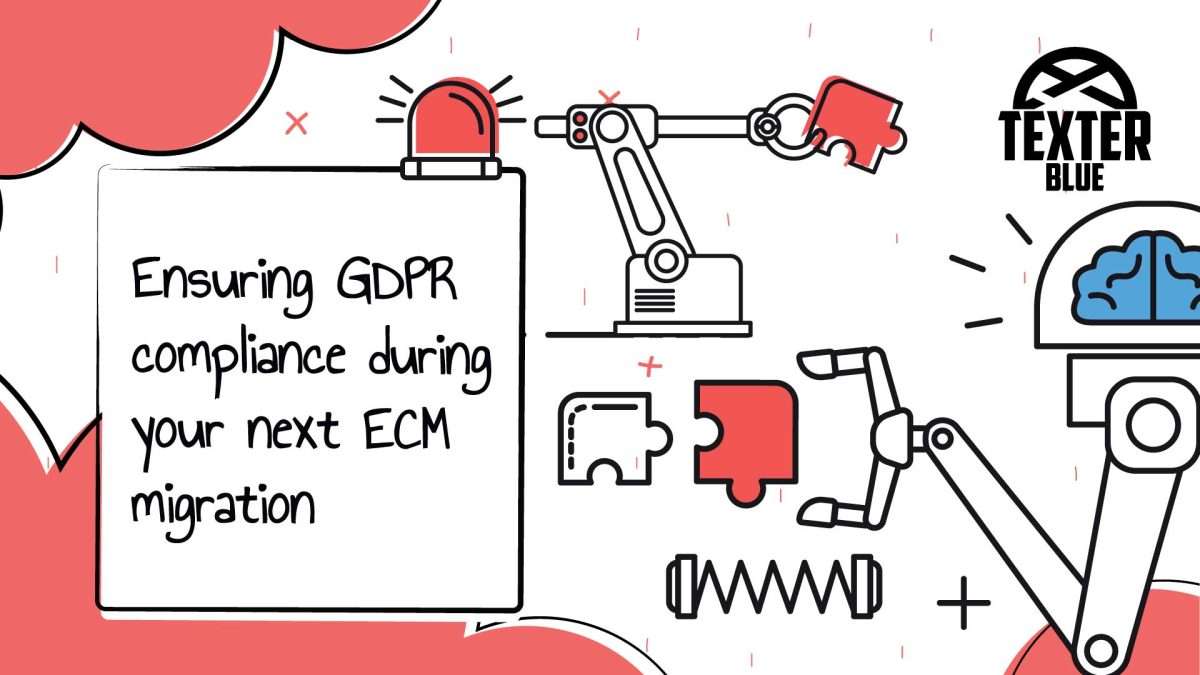In today’s digital world, businesses rely on ECM systems to store vast amounts of customer data. But what happens when this data includes information about European residents? The General Data Protection Regulation (GDPR) brings data privacy to the forefront for companies operating in the EU, requiring them to comply with stricter regulations.
In this article we will guide you through ensuring GDPR compliance during your next ECM migration.
5 advantages of cloud migration
The continued operation of legacy systems can present a significant obstacle to organizational effectiveness. Cloud migration offers a multitude of advantages that can enhance an organization’s overall success.
1) Cost efficient
Cloud migration offers substantial cost savings by eliminating the need for an on-premise infrastructure. Organizations can dynamically adjust resource allocation based on demand fluctuations, maximizing cost efficiency and eliminating wasteful spending. Cloud providers often offer competitive storage options, further mitigating the financial burden of data management and storage.
2) Increased innovation
Cloud platforms empower organizations to rapidly scale resources, enabling them to quickly adapt to market shifts or changes in customer demand. This adaptability extends to development processes, facilitating faster upgrades, cloud application development, and deployment. Additionally, many organizations can leverage cutting-edge tools, machine learning, and data analytics offered within the cloud environment.
3) Improved collaboration
Cloud migration enhances internal collaboration within an organization. Cloud systems offer centralized access to data and applications, enabling seamless collaboration across teams operating in diverse locations. Shared resources and real-time collaboration tools streamline communication, expedite processes, and cultivate a more flexible and efficient work environment.
4) Increased security
Cloud migration enhances security compared to traditional legacy systems. Cloud service providers invest heavily in robust security protocols, including frequent upgrades, stringent access controls, and encryption. These measures safeguard sensitive data from threats and unauthorized access. Furthermore, cloud platforms frequently adhere to industry standards and regulations, offering organizations a secure environment for their data.
5) Robust disaster recovery
The robust disaster recovery features offered by cloud platforms constitute a compelling argument for migrating from on-premise to cloud-based data protection. In the event of a disaster, the available backup and recovery methods enable organizations to rapidly restore their data and applications. This stands in stark contrast to traditional systems, which may need substantial manual intervention and lengthy data restoration procedures.
Overall, migrating to the cloud can help you save money, be more productive, and keep your data safe.
Migrating to the cloud while complying with GDPR
Moving your data and applications to the cloud can offer significant advantages to your business. However, if your organization deals with European resident data, the GDPR adds an important layer of complexity.
To ensure a smooth transition that prioritizes GDPR compliance, here are some key considerations:
- Robust security: Implement strong encryption and access controls to safeguard sensitive data.
- Limiting data collection: Only migrate the data you truly need, minimizing the potential GDPR risks.
- Clear agreements: Establish detailed data processing agreements with your chosen cloud service provider.
By carefully planning your cloud migration with GDPR at the forefront, you can reap the benefits of cloud technology while maintaining compliance with EU data privacy regulations.
Texport: Alfresco Exports & Imports by Texter Blue
Introducing a new mindset for upgrades and content transfer, we’ve developed a solution that exports and imports at object level supporting all Alfresco object types and it carries the symbology of true export.
Full Support – Supports content, metadata, relationships, permissions, versions, tags, categories, sites-memberships, and all other repository node relations from a source Alfresco repository to any target Alfresco instance.
Optimized – Multi-threaded tool that leverages low level OS and cloud resources via its close relation with Python, as such it’s fully optimized for export/import throughput, ingestion rates of up to 2800 nodes/sec.
Native S3 – Native S3 support allowing full repository bidirectional transfer from a normal fileContentStore into an S3ContentStore
Clean Data – Move all content or choose to archive or dispose certain areas of the repository – for example the archiving part of the audit-trail to increase database performance.
Record – Keep a record of all exports and imports executed for validation and data quality purposes. It ships with an ElasticShearch integration, providing robust dashboards in Kibana for content transfer executions overview.
Cloud Ready – Container friendly and Cloud ready, adding security and backup options in future relations.
A clever digital transformation…
Texport provides the opportunity to implement a clever digital transformation to the way the organisation interacts with their digital content, consolidating and enriching data – tagging, categorising, auto-classification, applying AI – thus increasing efficiency and optimising the investment.
Download here the Texport – Alfresco Exports & Imports – DataSheet:
By submitting you confirm that you have read and agreed with our Privacy Policy.
TML: Texter Machine Learning by Texter Blue
Your content and data are the foundation upon which your business operates, and critical decisions are made. Recent advancements in AI in areas such as image and natural language processing have enabled a whole new level of automatic extraction of information and data analysis that power the automation of key business processes not possible until now.
- Process your data with different AI engines, integrating the results.
- Supports several data formats: images, video, text, etc.
- Generate new content and document versions based on AI results.
- Store extracted information in metadata, enabling further processing and process automation.
- On cloud or on-premises – in case you don’t want data to leave your private infrastructure.
- Compatible with several different ECM providers
- Ability to develop custom AI models to target your specific needs and data.
AI is essential to remain relevant!
The adoption of AI in modern organisations is essential to remain relevant and competitive, optimising efficiency, empowering new business opportunities and freeing critical human resources to specific value-added tasks.
Download here our TML – Texter Machine Learning – Datasheet:
By submitting you confirm that you have read and agreed with our Privacy Policy.
If you’re struggling with your digital transformation, remember… you are not alone in this… Texter Blue is here to help you providing the best results! Make sure you read our news and articles and contact us.

